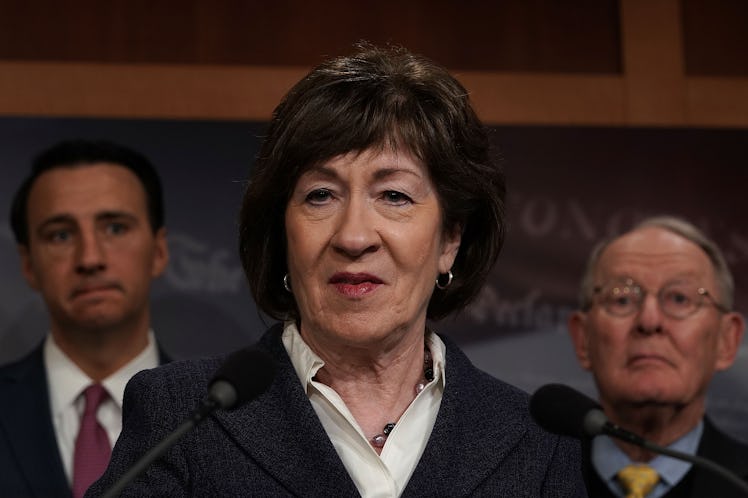
These Are The Republicans To Watch If You're Worried About Trump's Supreme Court Nominee
Justice Anthony Kennedy is out. President Donald Trump's new nominee will be in. Lots of names are being floated around, but the implications of a second Supreme Court judge nominated by Trump could be far-reaching. That is, provided that nothing unexpected happens in the nomination hearings, at which members of Congress will have the opportunity to vet whoever Trump nominates. Which Republicans might vote against Trump's Supreme Court nominees? This group of outspoken lawmakers is the one you should pay attention to.
The process works like this: A vacancy opens (either due to retirement or death), and the president nominates someone who is well-qualified to fill the position. Then, the nominee will be screened by the Senate Judiciary Committee, according to The Washington Post, and after a series of hearings, a nominee will either be sent on to the full Senate for a debate and a simple majority vote or the process starts all over again with new hearings. (Also of note, a nominee can withdraw himself or herself at any point in the hearings.) In that process, any number of Democrats or Republicans in the Senate might object to the nomination — which will be made clear in the debate process.
The Senate Judiciary Committee is comprised of 11 Republicans and 10 Democrats, but the Senate as a hole is comprised of 51 Republicans and 49 Democrats. Technically, only two Republican Senators would be needed to block the nomination. You can see how forecasting the exact outcome is a fool's errand. To make things more complicated, in order for these potential swing votes to make a difference, the assumption is that all Democrats will be voting against Trump's nominee. Three Democratic Senators voted for Neil Gorsuch, per CBS News, which could possibly mean it would also be easier for Trump's next nominee. Republicans stripped the filibuster option last year on Supreme Court nominations, per The Post, so the only real requirement for Trump's successful nomination is that it clears the 50-vote mark and Vice President Mike Pence would likely break the tie.
Trump's list of nominees has been circulating, and unsurprisingly, there's already a list of Democrats who have pledged to vote against his nominee. Trump reportedly will announce his pick on Monday, July 9, per The New York Times, and has temporarily reorganized his White House staff to make the nominee and messaging a priority. Obviously, there will be Democrats who challenge Trump's nominee, but there's also a growing list of unpredictable Republican lawmakers who might do so as well.
Take, for instance, Sen. Susan Collins, of Maine. She's been a swing vote on a lot of issues during the Trump administration's first two years, and she's already said on the record that she won't support a nominee who is hostile to Roe v. Wade.
"I would not support a nominee who demonstrated hostility to Roe v. Wade because that would mean to me that their judicial philosophy did not include a respect for established decisions, established law," Collins said on CNN's State of the Union on Sunday, July 1. Collins also reportedly met with Trump and urged him to expand his current list of potential nominees, per CNN. The Washington Post also noted that Collins voted for both of Obama's Supreme Court picks: Elena Kagan and Sonia Sotomayor.
Some other Republicans with questionable loyalty to Trump include Sen. Jeff Flake, of Arizona, who has been an incredibly vocal critic of the Trump administration (he once compared his rhetoric to that of Stalin), Sen. Dean Heller, of Nevada, who is the only Republican senator on the ballot representing a state that Hillary Clinton won, per The Washington Post, and of course, Sen. Lisa Murkowski, of Alaska, who like Collins, is partial to a justice that recognizes the decision of Roe v. Wade as law. Then, there's also Sen. John McCain, of Arizona, who has taken a leave of absence as he undergoes treatment for brain cancer. (McCain famously returned to the Senate to vote no on a skinny repeal of Obamacare in July 2017).
There's a lot of political guesswork happening in this in-between stage. Things will become much clearer once Trump officially announces his pick, and his or her judicial record can be further analyzed.
Trump's first appointee, Justice Neil Gorsuch, came to the bench after Senate Majority Leader Mitch McConnell blocked President Barack Obama's nominee, Merrick Garland. (Garland was nominated after Antonin Scalia's death in February 2016). Within an hour after Justice Antonin Scalia died in February 2016, McConnell announced that he would block any Obama replacement, according to The Huffington Post.
The Associated Press reported on June 27 that McConnell said his chamber will vote in the fall on Trump’s nominee. “It’s imperative that the president’s nominee be considered fairly and not subjected to personal attacks," McConnell said. As for what happens next, it's anybody's guess. There will almost certainly be backlash and protest based on whoever Trump's nominee is, given the way the Senate handled Garland's nomination. Strap in, everybody.